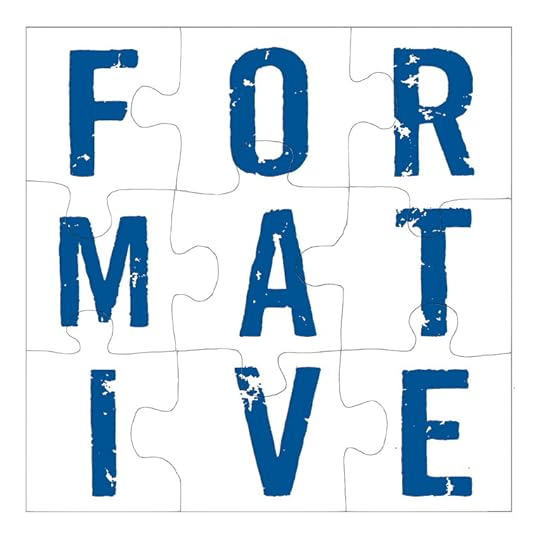Robb Ryerse's Blog, page 8
March 29, 2013
Living in Full Color
I grew up in a pretty black-and-white world. Certain things were right. And other things were wrong. There was no questioning. There was no qualifying. We clung to an idea of absolute truth and absolute morality that ~theoretically~ enabled us to live lives in accordance with God’s ~clear~ design.
Many years ago, I began embracing the grayness of life. Things aren’t nearly as black-and-white as I had previously been told. Many issues are much more complicated. They can’t be reduced to easy answers, even when we think that the easy answers will make our lives easier. If there is absolute truth out there, I’ve long since abandoned the idea that I can know it absolutely.
Lately however, even the life-is-gray approach hasn’t been resonating with me. I’m ready to leave behind the now stale black-and-white vs. gray argument. The old categories of binary black-and-white, even with the introduction of their moderation through gray, just aren’t cutting it for me any more.
I’m ready to begin living in full color. I’m no longer interested in figuring out how everyone else is wrong and how I am right. I don’t want to spend my time and energy my passing judgment on everyone else. I am at a point in my life where I simply want to appreciate things for what they are without the pressure to categorize them. I’m done seeing things in only the categories of black, white, and gray. I’m ready to see the full spectrum of beautiful colors.
Some things are black. Some things are white. Some things are gray. Some things are blue. Some things are red. Some things are orange. Some things are purple.
Let me give you just two examples.
Red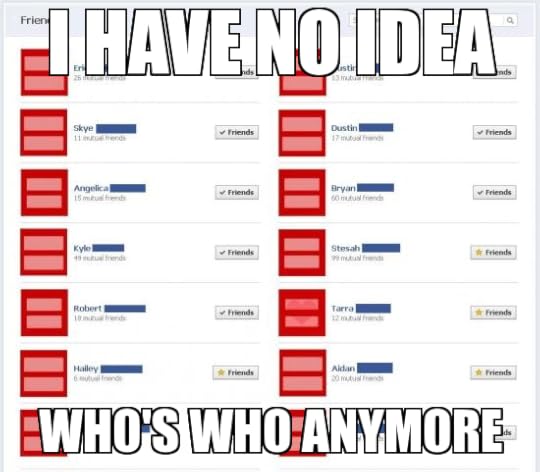 This week, Facebook got painted red. As two separate cases that impact the issue of same sex marriage went before the Supreme Court, millions of people on Facebook changed their profile picture to a red-and-white or red-and-pink equals sign. I was one of them. By doing so, we were showing our support for marriage equality.
This week, Facebook got painted red. As two separate cases that impact the issue of same sex marriage went before the Supreme Court, millions of people on Facebook changed their profile picture to a red-and-white or red-and-pink equals sign. I was one of them. By doing so, we were showing our support for marriage equality.
Not a week goes by that I am not asked about my position on the sinfulness of homosexuality, the place of LGBT people in the church, or the morality of same sex marriage. I have to admit, as I have done before, that this used to be a black-and-white issue for me. And then it became a gray issue, full of ambiguity and moderation and questions.
But it is no longer gray for me. There is no ambiguity about my love for my gay friends. There is no moderation in my belief that they should receive full and equal protection under the law. And there is no question that my life and my community is deeply enriched by their presence in it. This issue isn’t black-and-white. And this issue isn’t gray either. And so, this week, I was proud to have a red profile picture on Facebook.
Gold Everyday, it seems like a new article is published about some surprising and wonderful thing that Pope Francis has done. He washed the feet of inmates, including women and Muslims. He decided to live in the papal guest house so that he could stay in community with other men and women. He personally called his newspaper stand in Argentina to cancel his subscription. He had lunch with Pope Benedict and refused to be honored above his predecessor. He brought a measure of modesty to the papal throne. He went himself to pay his hotel bill in Rome.
Everyday, it seems like a new article is published about some surprising and wonderful thing that Pope Francis has done. He washed the feet of inmates, including women and Muslims. He decided to live in the papal guest house so that he could stay in community with other men and women. He personally called his newspaper stand in Argentina to cancel his subscription. He had lunch with Pope Benedict and refused to be honored above his predecessor. He brought a measure of modesty to the papal throne. He went himself to pay his hotel bill in Rome.
Over and over and over again, Pope Francis is demonstrating admirable humility. He is identifying with the poor and the marginalized. He is eschewing privileges so as to encourage the church to greater service. I can’t help but feeling like the Catholic church struck gold with this pope.
But I was raised to hate the pope, to believe that the pope would be aligned with the Antichrist. Even as I’ve said positive things about Pope Francis, some of my fundamentalist friends have denounced him to me in very black-and-white terms. I don’t feel about him like I was raised to feel.
But, admittedly, I do have some grayish and complex feelings about him and the Catholic church. I favor inclusion of women in church leadership. I believe that LGBT people should have rights and standing in both society and the church. I struggle with the excesses of the church and the ways that it still runs like a big business full of bureaucracy and patriarchy. And, I still wonder about all the unanswered questions about his involvement with the military dictatorship in Argentina.
And yet … I can’t help but hope that Pope Francis might just be the man to usher in a new golden age for the church. I am certainly rooting for him.
So, how about you? Have you given up living in black-and-white? Are you ready to trade in your gray too? How are you learning to live in full color?
The post Living in Full Color appeared first on Robb Ryerse.
March 28, 2013
I Need a Little Easter Right This Very Minute
The commercialization of everything.
The busyness of it all.
The nagging sensation that there must be more than Cadbury Eggs and bunnies and new clothes.
I am completely on board with everyone’s complaints and critiques of the Easter holiday. It has gotten to be so much like Christmas. The power of the story that we are celebrating gets lost on us because we haven’t been in a frame of mind to recognize it and receive it.
But instead of just complaining about this phenomenon, blaming the “liberal media” or whomever Facebook Christianity is pointing the finger at these days, in our church community, we try to do something about it. And so, each year at Vintage, we attempt to enter into the story of Jesus and re-live it. We attempt to walk with Jesus and his disciples through the final days of his life.
To do what they did.
To eat and drink what they ate and drank.
To see what they saw.
To feel what they felt.
And so, tonight we will gather on Maundy Thursday and reenact the upper room story. We will share bread and wine. We will humble ourselves to wash one another’s feet. We will humble ourselves to let our feet be washed. We will sing a hymn and then head out into the night with the sense that something is up.
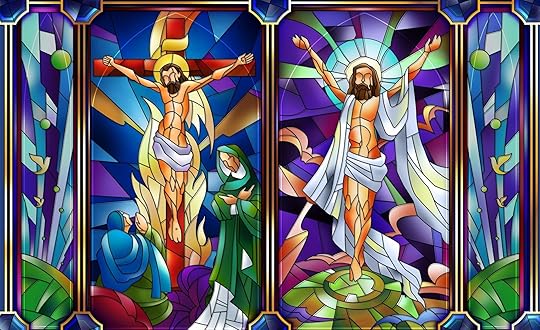 Tomorrow night, on Good Friday, we will gather again. This time, we will gather around the cross. We will listen to the crucifixion story. We will imagine the blood, the splinters of wood, the nails. We will listen closely and hear our friend breathe his last.
Tomorrow night, on Good Friday, we will gather again. This time, we will gather around the cross. We will listen to the crucifixion story. We will imagine the blood, the splinters of wood, the nails. We will listen closely and hear our friend breathe his last.
On Saturday evening, Holy Saturday, we sit shiva. We will come together and not say much. We will simply be. With our grief. With our pain. With our loss. With our darkness. We won’t say many words. The worst thing you can do at a wake is talk a lot.
And then on Sunday morning, we will get up in hopes of finding a miracle.
In all honesty, Christmas wasn’t all that magical for me this year. I don’t know if it was the shootings in Newtown or what, but this year, for me and a lot of my friends, it seemed like Christmas was just kind of blah. We did what we were supposed to do – and there is great value in doing what you are supposed to do even when you don’t feel like it – but we just didn’t feel it. I couldn’t find myself in the story at Christmas.
I am not having that problem this Lenten and Easter season. Things have been dark for me lately. I’ve been down and discouraged. My doubts have been great.
A variety of things have conspired to prompt me to feel this way.
(Now, I realize that what I am about to type qualifies as first world problems. I know that if I “count my blessings,” I’ll find far more than my discouragements. I know that other people have it worse. But I don’t live their lives. I live my life. And these are my feelings right now. For better or for worse, they are my current companions on my life journey. I’m not going to ignore them or pretend they are not there just because someone else might feel similarly with better reason or feel differently for no reason.)
More than seven years of church planting and pastoring at Vintage has produced a community that I love with all my heart. But if you had told me eight years ago that I would still be bi-vocational after seven and a half years, I would have laughed at you. And there is no end to that in sight. And, in all honesty, I don’t mind being bi-vocational so much, but work has been an unending series of stressors and disappointments lately. And, on top of that, six months after my book was published, I am left with the fact that I’m not a best-selling author or a great writer or someone with any kind of significant platform at all.
I feel invisible. And often I feel alone. And like I’m wasting everyone’s time.
So, yeah, things have been dark in my inner world lately. And that’s why I say I need a little Easter right this very minute.
For me, as a follower of Jesus, Easter is the reminder that darkness does not overcome the light. That good triumphs over evil. That grace and mystery and hope are all worth it in the end that comes after the end. That love wins.
And that’s what I need in my life right now. A little light. A little good. A little hope. A little Easter.
The post I Need a Little Easter Right This Very Minute appeared first on Robb Ryerse.
March 21, 2013
The Fundamorphosis Living Room Book Tour
I’ve been pretty quiet this week here on the blog.
That’s because it’s Spring Break. Vanessa and I loaded the three kids (but not the two dogs) into our Ford Focus and got out of town. (If I can work from home, I can work from anywhere, including the passenger seat of the car while Vanessa drives.) We have been crusing around the country talking about my book Fundamorphosis: How I Left Fundamentalism But Didn’t Lose My Faith.
 It’s the Fundamorphosis Living Room Book Tour. We show up. Our friends invite their friends. And we all talk about our theological journeys. I read a little bit from the book. And we end up swapping stories and laughing a lot.
It’s the Fundamorphosis Living Room Book Tour. We show up. Our friends invite their friends. And we all talk about our theological journeys. I read a little bit from the book. And we end up swapping stories and laughing a lot.
On Monday, we were in Pittsfield IL with our dear friends Michael and Keri Pierce.
On Tuesday, we were in Chicagoland at my cousins Laurie and Larry Matthias’ home.
On Wednesday, we got to Grand Rapids where my sister Cathy Fazio lives.
Today, we are headed to Elkhart IN to be with our old friends Joel and Shari Wolfgang.
And on Friday, we drive to Fort Wayne IN where Vanessa’s brother and his wife, Ron and Ashley Mattocks, are hosting us.
At stops along the way, we’ve talked with small groups of people about the book, about what faith looks like in a world that has radically changed, about the hot button issues in the church. We’ve sold a few copies of the book, made some new friends, and not gotten nearly enough sleep.
All in all, it’s been great.
If you’re in Indiana and want to come to one of our events there today or tomorrow, let me know, and I’ll send you the details. If you’d ever like to host a Fundamorphosis Living Room Book Tour, let me know. We’re making some plans for the summer and would love to come your way!
The post The Fundamorphosis Living Room Book Tour appeared first on Robb Ryerse.
March 14, 2013
Episode 4: Habemus Papam
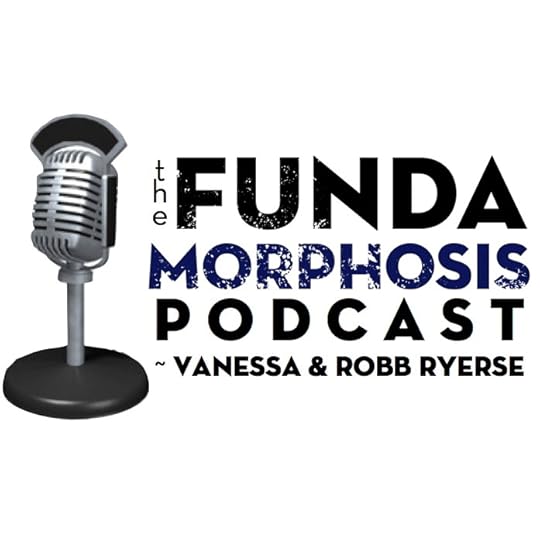 Vanessa and Robb interview Brian McLaren, discuss Pope Francis, evangelism, and Rob Bell, and answer listener questions.
Vanessa and Robb interview Brian McLaren, discuss Pope Francis, evangelism, and Rob Bell, and answer listener questions.
The post Episode 4: Habemus Papam appeared first on Robb Ryerse.
March 13, 2013
Win a Copy of Fundamorphosis
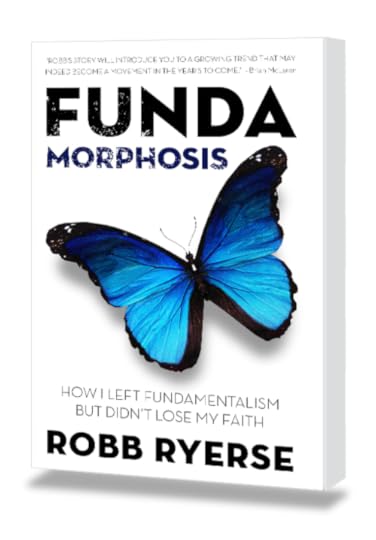 On Monday, April 1, I’m going to give away a free copy of my new book Fundamorphosis: How I Left Fundamentalism But Didn’t Lose My Faith. All you have to do to be entered to win is sign up to receive my newsletter. You can do that right over there, in the form on the right side of my website.
On Monday, April 1, I’m going to give away a free copy of my new book Fundamorphosis: How I Left Fundamentalism But Didn’t Lose My Faith. All you have to do to be entered to win is sign up to receive my newsletter. You can do that right over there, in the form on the right side of my website.
Don’t worry – I’m not going to send the newsletter out often. Trust me; I won’t spam you. Every once in a while, I’ll send you a newsletter with some updates about what I’m up to – on this site and in my life.
So … sign up today and get entered to win a free copy of Fundamorphosis.
The post Win a Copy of Fundamorphosis appeared first on Robb Ryerse.
March 9, 2013
Formative: Paul Hewson
I hate being cliche. I hate being stereotyped and pigeonholed. I prefer to be unexpected. I like it when people aren’t quite sure where I am coming from or what my opinion about something will be. I love minority reports, when someone goes against the conventional wisdom and sees things differently.
I tell you all of this because what I am about to say is unbelievably predictable.
Like so many other Christians of a certain age, I have been profoundly impacted in my thinking and beliefs about God and the world by an Irish theologian and artist named Paul Hewson.
You might know him better as Bono, lead singer of U2.
There is much to say about U2 in general and Bono in particular. I could talk about the band’s longevity. I could talk about how their concerts take on the feel of a worship gathering. I could talk about the spiritual dimensions of their songs, how they sing about so much more than sex and romance, and how that may have been the secret to their success. (Maybe we are not as shallow as we are often accused of being.)
Since this is Evangelism Week on my blog, I’d like to talk about how Bono has helped to make me a more globally-conscious person. And thereby, he has made me a better Christian.
Throughout his career, Bono has been an advocate for the world’s poor. From Band Aid in the 80s to the ongoing One Campaign, Bono has used his celebrity to give a voice to those who would otherwise be ignored. In fact, he has been an evangelist, seeking to convert the world’s privileged to the gospel of God’s kingdom.
Among the world’s most privileged are American Christians. We have needed to hear this gospel most. And Bono is the one who converted me.
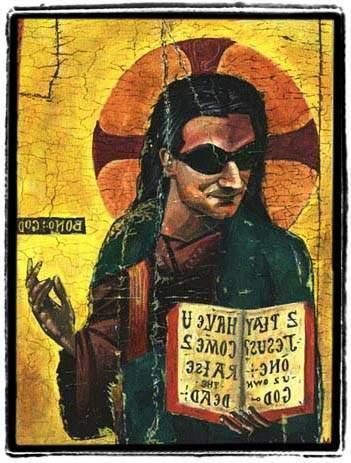
Slowly and over time, Bono has helped to shape how I see the world. He has helped me to realize that God is always found on the side of the oppressed. He has elevated the horrors of injustice in my consciousness. He has modeled for me what it means to be an influential leader in the cause of the kingdom.
When he sings Love and Peace or Else, I get it.
When he says, “As you enter this life, I pray you depart with a wrinkled face and a brand new heart,” I ache for all of the children who will never get to grow old.
When he rallies us with “The real battle just begun to claim the victory Jesus won,” I want to lend my voice and whole self to the cause.
When he admits, “I’m sick of hearing again and again that there’s gonna be peace on earth,” I am right there with him.
When he screams without raising his voice, “Jesus, Jesus help me / I’m alone in this world / And a fucked up world it is too / Tell me, tell me the story / The one about eternity / And the way it’s all gonna be,” I want to listen in on the conversation.
When over and over again he cries out, “How long?” I cry out with him.
How long will this injustice last? How long will the world remained unchanged? How long until God’s kingdom comes? How long? Those are the prayers I’ve learned to pray.
Check out the whole Formative blog series here.
And don’t miss this amazing interview with Bono.
The post Formative: Paul Hewson appeared first on Robb Ryerse.
March 6, 2013
Book Reflection: Why Did Jesus, Moses, the Buddha, and Mohammed Cross the Road by Brian McLaren
Every once in a while, you pick up a book that seems to be saying all the things you’ve been thinking. It’s such a wonder to have that kind of experience, such a confirmation and encouragement. In these types of situations, it’s not that you don’t need the author because you’ve got it all figured out. Rather, it is precisely that you need the author to give voice to your thoughts, to help you develop and further your perspective, and to lead you down the paths you were too nervous to traverse on your own. Finding a book that reinforces your own yet-forming thoughts and ideas is a revelation.
For me, Why Did Jesus, Moses, the Buddha, and Mohammad Cross the Road? by Brian McLaren has been just such a revelation.
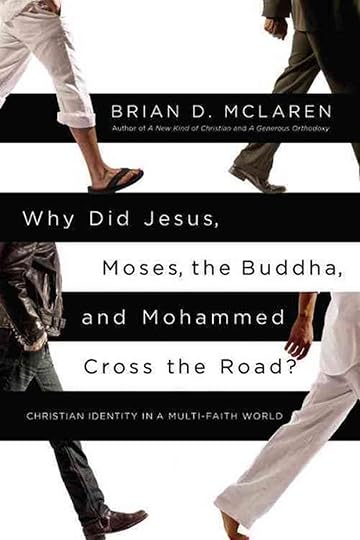
Why Did… is about Christian identity in a pluralistic, multi-faith world. McLaren describes and decries two extremes that are common in the church.
Many have a strong but hostile identity, proud to be a Christian but also antagonistic toward non-Christians. This kind of identity is seen everyday as Facebook Christianity wages a cultural (and often political) war against atheists, agnostics, and those of other faith traditions.
McLaren also observes that many in the church react against the strong and hostile identity by developing a weak and benign Christian identity. These are folks that are almost apologetic about being Christian, willing to subjugate their identity at the altar of political correctness.
McLaren finds both of these approaches to Christian identity, so common in both Evangelicalism and mainline churches, to be lacking. Rather than moderate between the two, the crux of McLaren’s book is that followers of Jesus today need to triangulate between these polar opposites and develop a strong and benevolent Christian identity. This identity is unapologetically Christian – devoted to Jesus, the Bible, and the church. But it is also benevolent, seeking the good, peace, justice, and well-being for all.
McLaren’s call for this kind of strong and benevolent Christian identity reminds me of the very essence of what Christian faith is. Faith is the confluence and expression of honesty, humility, and hope.
We must be honest. Our history (and our present) as Christians is a checkered one. We can’t rewrite our history and ignore all of the hostile and horrible things that have been done in the name of the church. We live in the information age. Everyone knows or can easily access the truth about Constantine and Columbus, for example. Honest faith and effective witness to it require us to not sugarcoat who we have been.
We must also be humble. Are we as Christians humble enough to admit that we don’t have all the answers? Are we humble enough to admit that expressions of faith will by necessity look different in varying cultures? Are we humble enough to admit that a quest to conquer all other religions doesn’t follow the cross’s pattern of vulnerability? Are we humble enough to admit that we don’t own a monopoly on God’s Spirit? Humility can only positively impact our witness.
And we must be hopeful. The gospel is that the kingdom of heaven is at hand. It is strong and benevolent Christian faith that gives us as followers of Jesus a vision for what the world could be. I love how McLaren expresses this vision:
With outstretched hands, smiling faces, and open hearts, we can move toward one another, meet in the middle, and walk side by side beyond the limits of our old suspicious, segregated spaces. We can reject the mutual hostility by which we have defined ourselves, respect the different gifts we bring one another, and inject fresh hope into the global human equation through the unexpected factor of human-kindness. Walking together, we can face our common threats and seek the common good, forging a future that would have been impossible any other way.
I am left with four take-aways from Why Did…
The Importance of Kindness
When I was a teenager, I listened to a lot of CCM, including Wayne Watson. In one of his songs, Watson succinctly sums up the crisis of a hostile Christian identity, “How’d the friends of Jesus ever get so mean?” For more than a decade now, McLaren has been a faithful and necessary voice, calling Christians to fundamental kindness and human decency. It is crazy that his voice has been so needed. I pray that the church hears it. I believe that what Generous Orthodoxy did for inter-denominational appreciation, Why Did… can do for inter-religious appreciation.
Repurposing Our Theology
In one section of Why Did…, McLaren takes previously-divisive tenets of Christian faith and shows how they can be used to foster peace and understanding between people. The whole section is a beautiful example of repurposing our theology, reforming it so that it can bear good fruit. The chapter on original sin alone is worth the price of the whole book.
Liturgy as Spiritual Formation
McLaren makes the case that the way we worship needs to help to form our strong and benevolent Christian identity. He urges us to pay attention to the words we use when we sing and pray as communities of faith. He asks us to think about how the Christian calendar and the sermon can be a tools in developing our identity. And in a footnote, he hints at an upcoming project called Subversive Liturgy. Color me intrigued.
What’s So Dangerous about Friendship?
What comes through loud-and-clear in Why Did… is that Christians need to be (more than just neighbors) good friends. We need to have agenda-less friendships with Muslims, Hindus, Buddhists, Jews, agnostics, and atheists. We have so much to learn, and friendship is the path to understanding. Our strong and benevolent Christian identity needs to be formed by the identity of our Lord, Jesus. Jesus was known as a friend. May we be as well.
Have you read Why Did Jesus, Moses, the Buddha, and Mohammed Cross the Road? What did you think? I’d love to hear your thoughts.
The post Book Reflection: Why Did Jesus, Moses, the Buddha, and Mohammed Cross the Road by Brian McLaren appeared first on Robb Ryerse.
Hunting for Souls: THIS Is Evangelism?
The post Hunting for Souls: THIS Is Evangelism? appeared first on Robb Ryerse.
March 5, 2013
Door-to-Door Soul Winning: THIS Is Evangelism?
Thanks to my friend Kathy Compton for sharing this evangelism horror story.
~~
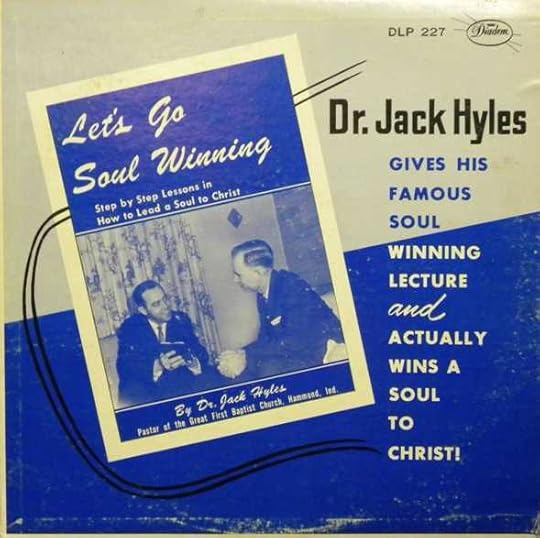
My pastor and youth pastor in suburban St. Louis in the 60s decided Jack Hyles and his school of evangelism and church growth were the best things to follow. They actually wanted to BE Jack Hyles and nearly destroyed our church!
I digress.
So they further decided that “anyone who really loved the Lord and wanted to serve Him” should go out witnessing. A few adults, mostly women, and a couple of teens, both girls (one of them me) climbed aboard the 15-passenger van and headed to downtown St Louis on Sunday afternoons.
Now, it was the late 60s, therefore safer than now, but the part of downtown we went to was pretty rough. The youth pastor, assuring us of his prayers, let each person off the van alone at the end of a street, and we went door-to-door, Bibles in hand, and knocked.
Our instructions were to ask whoever answered, “If you died tonight, would you go to heaven?” That was intended to get a no response, so that we could then launch into the “convince them they are going to hell and don’t want to” routine.
The driver/youth pastor did not drive around looking out for us…he had a street of his own to cover! When we finished our street, we waited at the corner for him to pick us up. He was a talker so we waited awhile to be picked up.
Ok, it was daytime, he was praying, and we did get “responses,” (people prayed the prayer) but wow, what a dangerous way to try to accomplish evangelism! And there was no follow up…
~~
Do you have an evangelism horror story? We’d like to hear it. Email me at robb (at) vintagefellowship (dot) org.
The post Door-to-Door Soul Winning: THIS Is Evangelism? appeared first on Robb Ryerse.
The Evangelism Project
This round of Experimental Collectives at Vintage Fellowship have been focusing on the idea of purpose. The way of Jesus invites us to realize that there is a much bigger world out there than we are used to seeing. So many of us spend all of our focus and energy on ourselves – what we are doing, what we want, what our needs are. Jesus modeled a much different life, a life that focused on the presence and perspective of others. As long as we live life selfishly, we’ll never find our purpose for living.
To get a better understanding of the other people around me and in my area, I joined the Evangelism Project collective. As a group, we visited gatherings at four other faith communities. We went to a Torah study at a Jewish synagogue, a vespers service at an Orthodox church, a Hindu temple, and a Muslim mosque (links below). The name “Evangelism Project” was tongue-in-cheek. We did not go to convert, argue, or protest. We went to watch and listen, to understand.

On Their Own Terms
Every time that I have learned about other faith traditions or religions, it has been on Christian terms. It has been in a Sunday school class or in a Bible college and seminary course or in a Christian book about apologetics. Without exception, it has been Christians explaining to me what non-Christians believe. Always through the grid of we-are-right-and-they-are-wrong. Always with the purpose of learning how to convince them that they are wrong. Always with the goal of conversion.
Never for the purpose of understanding. Never on their own terms. Never on their own turf.
One of the great things about this experiment was that we were going to be on their turf. We were the ones who were going to be uncomfortable. We were the ones who wouldn’t know what was coming next. It is a humbling thing to intentionally be uncomfortable. If James is correct, when we humble ourselves, God shows up. I think God showed up in unexpected (for me) places through this experiment.
And, let me just make a side comment about their own turf. In each place we gathered, I was amazed by the engaging architecture or decor. Creativity and beauty reflect the image of God, and I was able to see that image in unique ways in each of the locations where we met.

Warm Hospitality
I can honestly say that I did not enjoy every minute of every experience we had. The Torah study at the synagogue went for nearly three hours. The liturgy at the St. Nicolas was spoken so quickly that I often had no idea what was being said. Sitting on the floor at the Hindu temple was uncomfortable. And both the Hindu and the Muslim services had large parts of them that were not in English, making it difficult for me to know what was happening.
Some of the gatherings themselves were more welcoming and accessible than others. However, without exception, everywhere we went, we met warm and hospitable people. We were not treated with suspicion. We were warmly greeted. People spent time explaining to us what was going on, what the beliefs underlying the practices were, and how we could best observe and participate. This warm hospitality has led to the possibility of new friendships. In the next couple of weeks, I’ve got plans to get together with the Orthodox father and the Muslim imam.

Strong, Kind Christian Identity
While this experimental collective has been going on, I also read Brian McLaren’s new book Why Did Jesus, Moses, Mohammad, and the Buddha Cross the Road? (I’ll be posting a review of it tomorrow as a part of Evangelism Week.) In the book, Brian calls for us to have a strong, kind Christian identity.
It’s completely acceptable for me to be a Christian. My life is devoted to Jesus. I revere the Bible, Old and New Testaments, as the word of God. I believe in the sacraments, in church, in the cross and resurrection of Jesus. And I don’t have to apologize for this. Each time that I came home from one of the gatherings, I would say the same thing to Vanessa, “I don’t think I’m going to convert.” The story of Jesus is the story that resonates with me. It is the story in which I find myself.
I think that many Christians are scared to engage in the kind of experiment we did because they are afraid that their own faith won’t be able to hold up. They are afraid of being exposed to something that shatters their carefully constructed world. I think this fear may be unfounded. I am no less a Christian – and neither is my 11-year-old son who went with me to every service – than I was when I started. In fact, I think my faith is stronger because of this experiment.
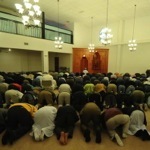
And, I think I am more prepared to be kind. Just because I am strongly Christian in my identity doesn’t mean that I need to be threatened by others. And maybe more importantly, I have no reason to be unkind to others. Benevolence, understanding, patience, listening – these are all characteristics that need to be part and parcel of what it means to be Christian. These need to be my posture toward others.
Hatred comes from fear. Fear comes from the unknown. The unknown is what I don’t understand. This collective has been a journey of understanding. The understanding I’ve gained means I don’t have to be afraid of the other. In fact, I can love the other. And that is evangelism.
~~
Here are links to the faith communities that welcomed us over the past month:
Temple Shalom of Northwest Arkansas
St. Nicholas Eastern Orthodox Christian Church
Hindu Temple of Northwest Arkansas
Islamic Center of Northwest Arkansas
~~
Are you a Christian who has visited other faith traditions? What have your experiences been like? We’d like to hear your story!
The post The Evangelism Project appeared first on Robb Ryerse.

